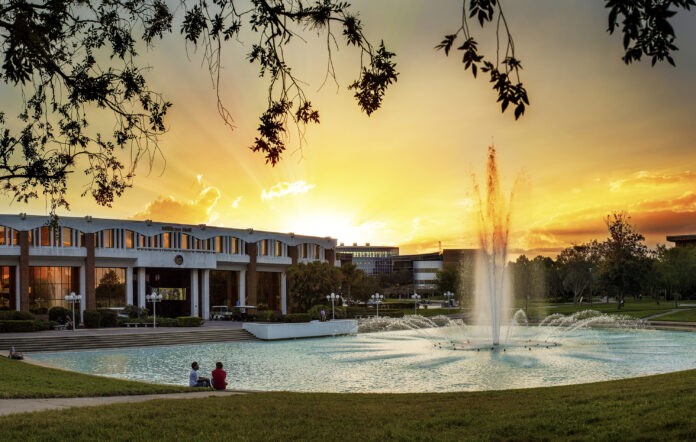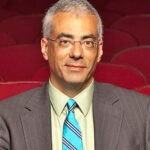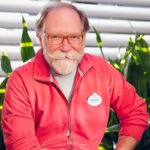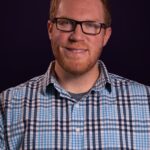Interview with Peter Weishar
by Judith Rubin
Where can you get a college degree to prepare for a career in the theme park industry – or if you’re already an industry professional, brush up your skills and portfolio?
Peter Weishar, Professor of Themed Experience at the University of Central Florida (Orlando), spoke to InPark editor Judith Rubin about the new Master of Science in Themed Experience program at UCF, first announced in February 2021. The 33-credit program is designed to be completed in four semesters.
Tell us about the structure of the program and what makes it unique.
At the core is a sequence of studio classes: Themed Experience Seminar, Small Project Studio, Immersive Experience Studio, and Collaborative Project Studio. A primary goal is to help candidates develop a specific portfolio in order to pursue a creative career. We don’t just focus on the aesthetics: we teach context, research and encourage exploration into new applications of themed experience that range from religious spaces, to retail, museums, libraries, schools, education, and of course, theme parks.
What has the response been like?
There has been a great deal of enthusiasm, and far more applicants than expected. Admissions are capped at 15 to keep class size small and ensure individual attention, but next academic year, we will double the size of our program, and if all goes according to plan, we will grow by about one-third the following year. In addition to student interest, dozens of industry leaders have contacted us to ask how they can get involved.
What is the pool of applicants like?
About half of the applicants are working professionals. Most have a background in the visual arts, some are writers, and a number have engineering backgrounds. I think ours is one of the few programs for individuals to bridge that gap where an engineer can express their creativity.
How are these programs enriched by the Orlando location, and collaboration with the industry?
We are collaborating with Christie on a projection mapping practicum class. The connection was facilitated by Larry Howard, Christie’s Senior Director of Entertainment Sales, Global Entertainment Development, who is based in Orlando. Christie is lending UCF four projectors as well as licenses for Christie Pandoras Box software. Their in-house trainer/artist will be working with students developing original content that will be showcased on the main campus the following semester.
We are also working with Cecil Magpuri, founder and Chief Creative Officer of Falcon’s Creative. Next semester, he and I will co-teach a class that allows students to experiment and develop content for some of the groundbreaking work done in Falcon’s X-lab. We are going to be able to work with the team at Falcon’s on their site, which is located near the main campus.
In addition, we have some distinguished adjuncts who are accomplished, active industry professionals. They include EXP Principal, Director of Lighting Design Aram Ebben, IALD, CLD, LEED AP; show writer Allison Moran; and Mike Wallace, Chief Creative Officer, Harves Entertainment. We try to pull all adjunct instructors teaching studio classes from the field, to get the right balance of practitioners to full-time academics. As the program grows, we will need more experienced professionals in front of the classroom.
There’s excitement and energy on all sides regarding these collaborations, which give students the opportunity to form in-depth working relationships with successful industry veterans. Aram has summed it up by saying, “I believe that those of us who have been in the business for some time owe it to the next generation to share our knowledge with them.”
How does this program complement other educational tracks at UCF?
A program like this is only possible at a major research University such as ours. Themed experience development requires collaboration between multiple disciplines in a professional environment, and students can emulate that kind of collaboration across UCF. In both the MFA and the MS in Themed Experience, students are required to take classes at the UCF Rosen College of Hospitality Management, with whom we are working closely to develop a wider range of graduate level courses in themed entertainment management and operations. The MS also requires a class in Engineering, and Themed Experience students have already been part of some successful collaborations with the renowned UCF Engineering program [See “Taking UCF students to the cutting edge of VR,” InPark issue #85, 2020]. We also work closely with UCF School of Performing Arts, UCF School of Visual Art and Design, and half a dozen other disciplines.
What are some other ways this program stands out?
I feel that UCF offers the ideal combination of academics, studio courses and location. I moved to Orlando and accepted a position at UCF because it is the perfect place to study themed experience and entertainment. Our degrees are offered on the main campus of what is a major research university and one of the largest universities in the country. Students can take electives in almost every discipline imaginable and have access to tremendous resources.
This top-quality program is also very affordable. The tuition at similar private school programs is literally over seven times in-state tuition at UCF. The low tuition at UCF takes a lot of pressure off our students. And our faculty are just incredible. Of course, not every program is right for everyone. Today there are numerous options for students who wish to pursue careers in themed experience and entertainment. This is a wonderful thing and was not the case just a few years ago.
Would it benefit those who are already working, even established, to enroll for this degree?
Our new MS degree was developed with industry professionals in mind.
Many of our students are already working in the field. They are looking to make the leap from producer or assistant designer to art director or creative director. The graduate degree helps them hone their skillsets and develop a tailored portfolio that will showcase their talents.
Almost all the classes are taught one evening per week to accommodate full-time workers. We also deliberately created classes and assignments that are directly applicable to the kind of work needed in the field. This is a big help in an industry where NDAs prevent applicants from showing their current work in their portfolio. There are no NDAs preventing a person from showing their own student work.
You’re a pioneer in the creation of themed experience curricula at the university level. What background and inspiration did you bring to this?
My father was a scenic designer, and I designed environments for video games before becoming a professor. So, narrative environments had always fascinated me. I was inspired to act after watching the 2007 “Last Lecture” by Randy Pausch, Professor and Director of the Entertainment Technology Center (ETC) at Carnegie Mellon. This heartbreaking and inspirational lecture, given by an asymptomatic yet terminally ill professor taking stock of his life and achievements, is a must-see that will change your perspective on life. Pausch spoke about collaborating with WDI and later forming the ETC with Don Marinelli. So, I thought if Randy Pausch could develop this at CMU, I could make it happen at my institution, which at the time was Savannah College of Art and Design (SCAD). ETC has a broader focus – also covering gaming, digital media, etc. I developed the first program to focus exclusively on themed experience and entertainment, but CMU was the first to make it part of an academic degree.
I was lucky to have the support of Patrick Brennan at WDI in Orlando to develop the first themed entertainment class at SCAD. Patrick is a 32-year veteran creative executive of Walt Disney Imagineering. He and I began by setting up an off-campus class where students spent a full week backstage at Walt Disney World and worked and learned from some 40 Imagineers, with Gary Landrum as our guide. Gary gave brilliant lectures and I credit him with many of the core ideas I teach today. We are fortunate to now have Patrick Brennan as an adjunct professor at UCF.
After years of persistence on my part, SCAD ultimately approved a new degree in Themed Entertainment Design. I give credit to Paula Wallace, President and Founder of SCAD, for her foresight in green-lighting a new academic discipline.
Joining UCF in August 2018, the process was more straightforward. I was brought on board by Jeff Moore, Dean of the College of Arts and Humanities, to start the themed experience graduate programs. We were able to get the MFA up and running within six months of my arrival on campus. The new degree, however – the MS in Themed Experience that we’re discussing here – is a separate degree program and a unique academic unit. The MS approval was a multi-year process with a proposal of 300+ pages that went all the way up to the Florida Board of Governors. Associate Dean Lynn Hepner and Special Assistant to the Dean, Paul Lartonoix were two people instrumental in the effort.
What have you learned in the course of things?
Good question. Academics are paid to always keep learning. That is one of the things that makes the job so terrific. The more I learn about themed experience, the more I realize there is to know. I can look back over a decade later and say, “Yeah, I was right, themed experience should be its own academic discipline,” but I did not realize the incredible potential and seemingly endless depth of the field. • • •











